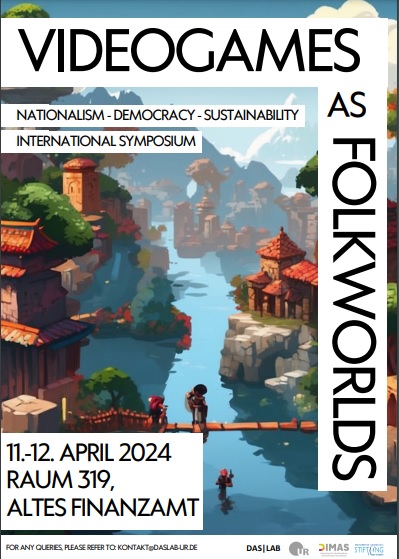
Videogames are a mass medium whose global sales and user numbers have exceeded those of the film and music industries for over a decade. However, they serve much more than just entertainment purposes. As interactive, educational experience worlds, they are used by governments and paramilitary groups as propaganda tools and military training simulators, e.g. in the Ukrainian War. Simultaneously, videogames can serve to convey and critically engage with culturally specific and folkloric content and thus pursue pacifist, democratic and sustainability-promoting goals. Although this dual role forms the basis of much public controversy, there is no comprehensive scientific/scholarly understanding of how videogames as folk worlds can impact intercultural understanding in anti- and prosocial ways. Nor do we have the methodological tools to perform such research in qualitative, quantitative and mixed approaches. To address this lacuna, this international symposium serves to develop a systematic transdisciplinary research program in videogames as folk worlds and as tools for transcultural understanding. The contributions range from media, literary and cultural studies to computer science, anthropology, educational psychology and political science.
Generously funded by the Vielberth Foundation and sponsored by the Leibniz Institute for East and Southeast European Studies and the Department of Interdisciplinary and Multiscalar Area Studies at the University of Regensburg, this two-day symposium will analyze the dual role of computer games as transregional, nationalistic propaganda machines on the one hand and as democracy and diversity-fostering, critical and prosocial media experiences on the other. It will explore how the social and political actions of players are shaped by nationalist or fascist content, how such content appears in games, and how, conversely, pro-democracy, sustainability-promoting elements can be incorporated, experienced and learned in and through the design of alternative “indie” games.
An extensive conference report by Hanna Weimann (University of Stuttgart) is available here.
Programme
| 9:00h | Welcome and reception | Coffee/tea | |
| 9:15h | Opening address by the Dean of the Faculty of Languages, Literatures, and Cultures | Prof. Dr. Maria Selig | |
| 9:20h | Introduction, rationale and goals; “Folk Mechanic as Transregional Anthropocene Criticism in Indigenous Video Games” | Astrid Ensslin | |
| 9:45h | “A world to escape to: Gameworlds as otherworlds in datafied society” | Dom Ford | |
| 10:30h | Break | Coffee/tea | |
| 10:45-13:00h | Panel 1: Folk and Folklore in Games | Chair: Tomasz Majkowski | |
| 10:45h | “Who Are the Folk in 2024”? | Kristian Bjørkelo | |
| 11:30h | “Popular Heritage in Chinese Gameworlds: From a Tripartite Schema to Straightening?” | Bjarke Liboriussen | |
| 12:15h | „The Amorphology of Folk Games: Indian Videogames and Folk Narrative Traditions“ | Souvik Mukherjee | |
| 13:00h | Lunch | Fingerfood buffet | |
| 14:00h-16:15 | Panel 2: Tradition, Nationalism, Essentialism | Chair: Kristian Bjørkelo | |
| 14:00h | „Games and Invented Traditions“ | Tomasz Majkowski | |
| 14:45h | „Decolonizing Sweave: African Tradition and Alternative Cultural Pedagogies“ | Kwabena Opoku-Agyemang | |
| 15:30h | „The European video game exists. Do we need it?“ | Victor Navarro Remesal | Zoom |
| 16:15h | Break | Coffee/tea | |
| 16:30h | Graduate intervention / Surprise | Chair: Sebastian Richter | |
| 17:30h | Free time | ||
| 19:00h | Dinner, followed by guided walk through Regensburg |
Day 2 (12 April)
| 9:00-11:15h | Panel 3: Sustainable Politics and Pedagogies | Chair: Kwabena Opoku-Agyemang | |
| 9:00h | „Materiality of Digitality. The Politics and Ethics of Making Videogames“ | Sonia Fizek | |
| 9:45h | „On the Representation of Repair and Maintenance Cultures in Computer Games“ | Sebastian Möring | Zoom |
| 10:30h | Video recording (extended version, courtesy of University of Tampere) | Xenia Zeiler | |
| 11:15h | Break | Tea/coffee | |
| 11:30-13:00h | Thinking Ahead: Utopias, Visions, Actions | Chair: Astrid Ensslin | |
| 11:30h | „Re-Configuring Petrified Politics: Folk Games as Tools for Progressive Utopian Populism“ | Holger Pötzsch | |
| 12:15h | Joint discussion: where to next? (funding programs, publications, Nordic Digra 2025 panel and brainstorming for topics and RQs) | Hosts: Astrid and Holger | |
| 13:00h | Lunch | Fingerfood catering | |
| 13:30h | Small group work: designing new projects | Hosts: Astrid, Kristian and Tomasz | |
| 15:00h | Reporting back and closing discussion / forward planning | ||
| 16:00h | Symposium ends |
